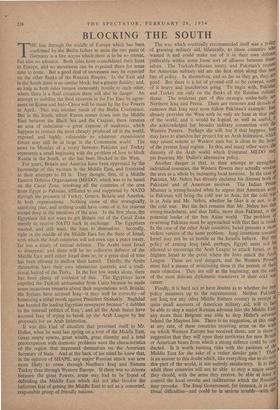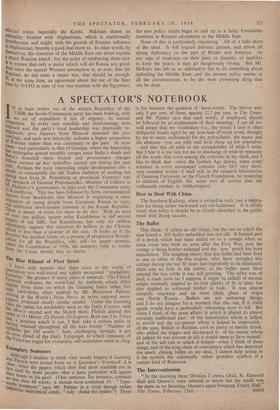BLOCKING THE SOUTH
THE line through the middle of Europe which has been confirmed by the Berlin failure to unite the two parts of Germany is a line across which there is to be no retreat, but also no advance. Both sides have consolidated their front in Europe, and no movement can be expected there for some time to come. But a good deal of movement may be expected on the other flanks of the Russian Empire. In the East and in the South there is no similar block, but a greater fluidity; and, so lott as both sides remain immovably hostile to each other, where there is a fluid situation there will also be danger. An attempt to stabilise the fluid situation in the Far East by agree- ment on Korea and Indo-China will be made by the five Powers in April. This was another result of the Berlin Conference. But in the South, where Russia comes down into the Middle East between the Black Sea and the Caspian, there remains an area of indecision--a great expanse of weakness, which happens to contain the most cheaply produced oil in the world, exposed and highly vulnerable to whatever expansionist forces may still be at large in the Communist world. The news on Monday of a treaty between Pakistan and Turkey represents a small beginning with the problem of how to block Russia in the South, as she has been blocked in the West. The way which eventually recommended itself was a policy of granting military aid, bilaterally, to those countries who wanted it and could make use of it in their own defence preferably within some loose, sort of alliance between them' selves. The Turkish-Pakistan treaty, and Pakistan's request for American military aid are the first steps along this nevi line of policy. In themselves, and so far as they go, they are i good. But there is a lot of ground still to be covered, some' of it heavy and treacherous going. To begin with, Pakistan and Turkey are only on the flanks of the Russian military threat. The tenderest part of this strategic under-belly are, Northern Iraq and Persia. There are rumours and denials 01 rumours that Iraq may soon follow Pakistan's example; Ira(' already provides the West with its only air base in that P of the world, and it would be logical, as well as useful, she acknowledged her broader military connection with the Western Powers. Perhaps she will; but if that happens, Iraq may have to abandon her project for an Arab federation, which may sound remote to Western ears but is close to the heart of the present Iraqi regime. In this, and many other ways, the disunity of the Arab world which frustrated MEDO may yet frustrate Mr. Dulles's alternative policy. Another danger is that, in their attempt to strengthen individual countries, the Western Powers may actually weaken the area as a whole by increasing local tensions. In the case of, Pakistan, Mr. Nehru has already declared his distrust both 01 Pakistani and of American motives. The Indian Prime Minister is wrong-headed when he argues that American arMS in Pakistan will bring the cold war to Asia; for the cold wet is in Asia and Mr. Nehru, whether he likes it or not, is to the cold war. But the fact remains that Mr. Nehru has this wrong-headedness, and that India, more than Pakistan, is the potential leader of the free Asian world. The problem of re-arming Pakistan must be approached with that fact in mind' In the case of the other Arab countries, Israel presents a more violent version of the same problem. Iraqi intentions towards Israel may not be as hostile as the Israelis believe. But the policy of arming Iraq (and, perhaps, Egypt) must not he allowed to encourage the Arab League to attack Israel, or to frighten Israel to the point where the Jews attack the Arab League. These are real dangers, and the. Western Powell must find a means of minimising them in the pursuit of thoit main objective. They are still at the beginning, not the ad, of the most delicate diplomatic manoeuvre in their cold war career. effected tribes, especially the Kurds. Pakistan shares an ,Urlhealthy frontier with Afghanistan, which is traditionally Fnublesome, and might, with the growth of Russian influence 112 Afghanistan, become a good deal more so. In other words, by lnetnselves, the countries of the Middle East can never repulse Major Russian attack; but the point of reinforcing them now 13 to ensure that only a major attack will do Russia any good. 1.%_,11d since the central Western assumption is, as ever, that the II, do not want a major war, that should be enough. ,11. at the same time, an agreement about the use of the Suez base by NATO in time of war was reached with the Egyptians, the new policy might begin to add up to. a fairly formidable deterrent to Russian adventures in the Middle East.
None of this is particularly reassuring. All of it falls short of the ideal. It will require delicate, patient, and above all strong diplomacy on the part of Britain and America. At any sign of weakness on their part, or disunity, or inability to keep the peace, it may go dangerously wrong. But Mr. Molotov has left us no alternative but to do something about defending the Middle East; and the present policy seems, in all the circumstances, to be the most promising thing that can be done.



































 Previous page
Previous page